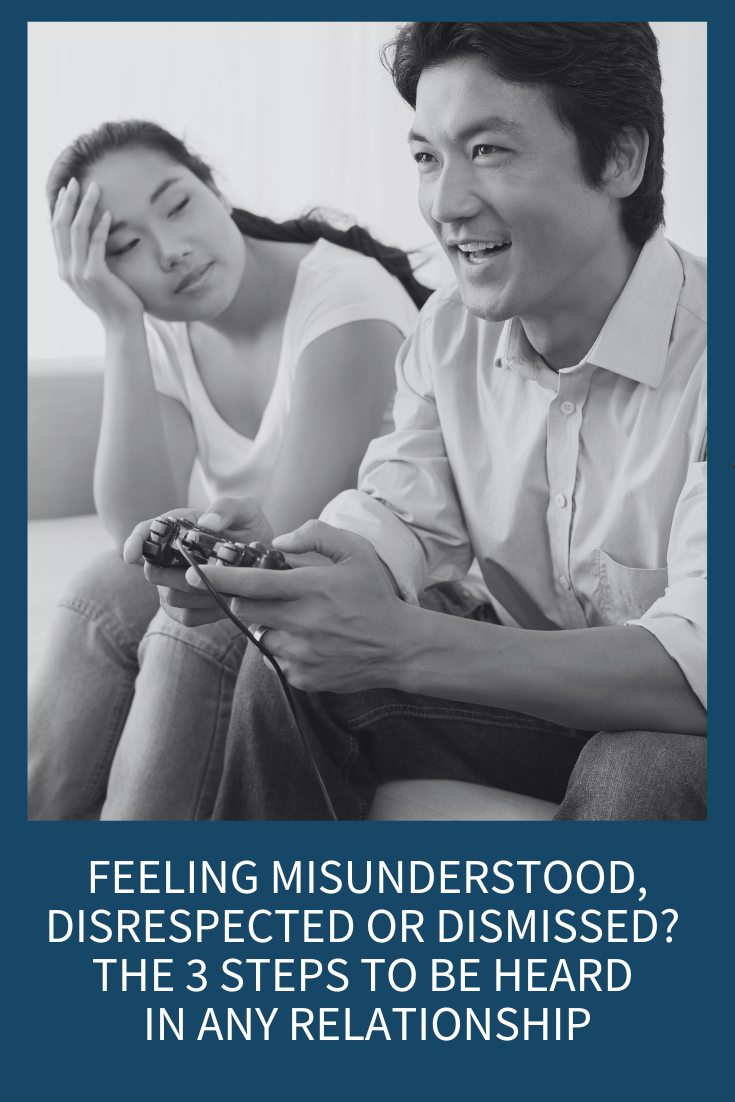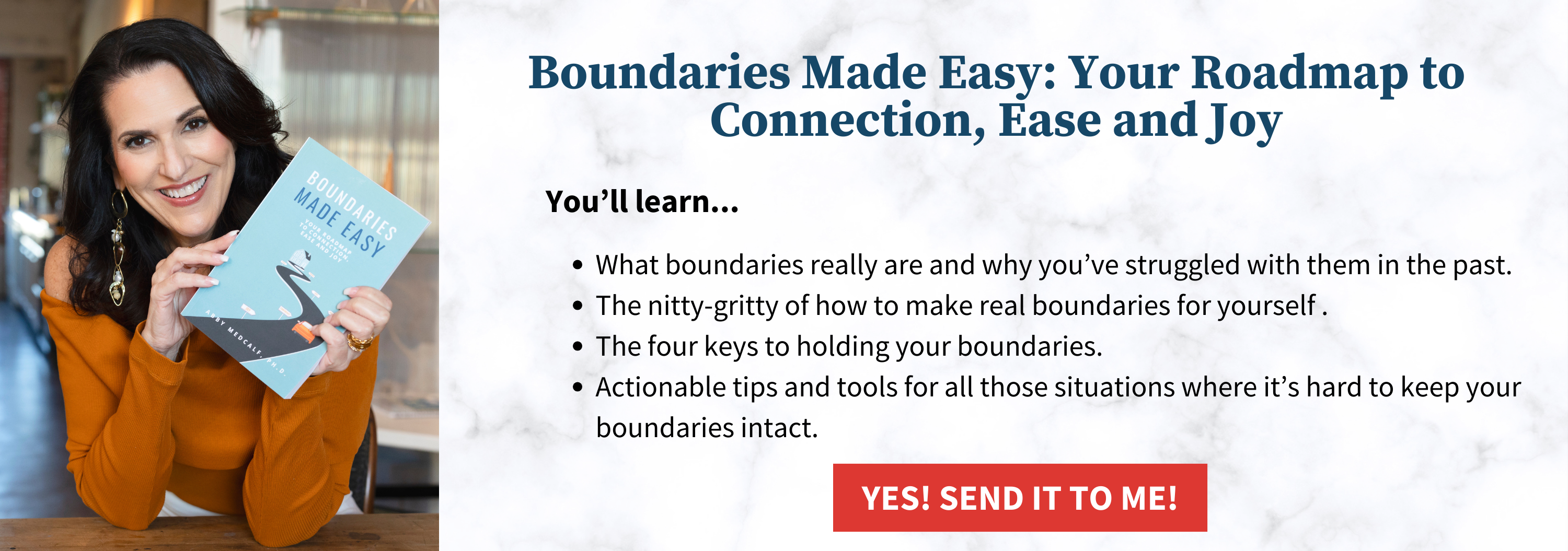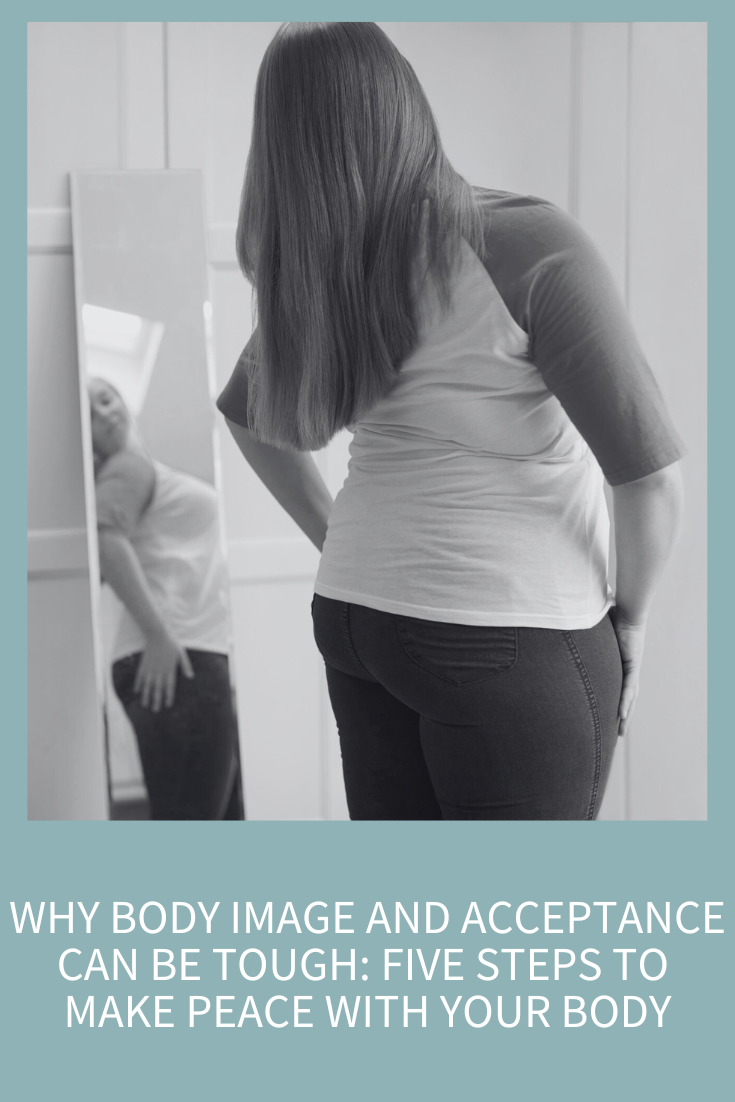
Are you walking away from conversations feeling misunderstood, disrespected or dismissed? Do you find yourself repeating the same questions or desires over and over again, but nothing ever changes? Are you looking for ways to finally feel heard in an important relationship? Well, you’re in the right place! Whether you’re struggling with your partner, dad, sister or best friend, this three-step process for being heard in any relationship is going to help.
7-minute read
The 3 Steps to Be Heard in Any Relationship
Step One: Take Full Responsibility
Sure, I know it’s all their fault, but if you go into any conversation with that attitude, you can’t expect the other person not to get defensive, angry or check out and want to avoid you.
And, I’m being facetious here because it really isn’t all their fault, and if you think it is, then you’ve really got to pay attention today. You co-create every single relationship you’re in, so you have responsibility in this relationship and you have 100% responsibility for your own feelings and reactions. Yes, I said it. If you want to be a victim in your life and blame everyone else for how you feel, this isn’t the place for you (I say with love). But, if you’re looking to really change how and who you are in your relationships… if you’re really wanting to have connection, ease and joy, then it’s time to put on those big gal/guy/non-binary pants and look at yourself first.
I understand that it takes two to tango in any relationship, and the other person might be acting like a total asshole, but it’s still you that needs to look at yourself first and take responsibility. I didn’t say it was easy or fair, but it’s the only way to get to the peaceful place you’re looking for. If you want to stay upset, blaming and resentful, then by all means keep doing what you were doing.
Taking responsibility for your own feelings and reactions is first and foremost because you might find that you don’t even need to share this thing that bothered you so much! You might realize that you were being triggered by something from your past and be able to sort your feelings on your own. At the very least, you’ll have a very different way of approaching the issue with the other person if you have some “aha” moments first.
A great tool I use with my clients is something I learned in the business world. It’s called Root Cause Analysis (RCA). In business, RCA is a grouping of techniques and strategies that are used to identify the root cause of a trend or event. You’re looking beyond the obvious or superficial cause and effect. You’re looking for where a system or process failed or caused an issue in the first place.
And you can perform a little RCA on yourself too. Here’s what I have my clients do: Think about the issue you’re having with, let’s say, your partner. Maybe you’re feeling really angry because you were out to dinner with some other couples last weekend, and they said something that belittled you or threw you under the bus, or pointed out a mistake you’d made and laughed at it.
I ask my clients to write this down, but you can also do this next part out loud or in your head. Ask yourself, “What makes (insert what they said) a problem for me?” Then write down or note your answer. Maybe your answer is, “They embarrassed me in front of my friends.”
Now you’re going to ask the same question but insert your last answer. So now you’d ask, “What makes the fact that they embarrassed me in front of my friends a problem for me?” You’re going to answer this again. “Well, we’re supposed to be a team, and they didn’t have my back when they said that.”
Now you’re going to ask the same question again with this last answer: “What makes us not being a team and my partner not having my back a problem for me?” What’s going to happen is you’re going to get closer and closer to your “real” answer and the real reason you’re upset.
- “I feel abandoned and rejected when they say things like that.”
- “I feel so alone in this relationship.”
- “I don’t feel cherished and adored.”
- “It reminds me of how my dad treated me when I was little, and I never felt like I belonged.”
When you get to the real reason, you get past the anger and having the same conversation over and over again. Maybe you even decide to take this issue to therapy first. We connect with feelings, not thoughts so, at the very least, when you come to your partner with your true, vulnerable feelings, you’re going to have a different conversation.
Step Two: Set the Stage for Success
If you go into the conversation expecting a fight, that’s what you’ll likely have. If you go in tired or having this conversation at 11:00pm, your chances of it going well are greatly diminished. There are a few things to have in place to set this conversation up for success:
- Make sure you’re both in a calm, good place and refreshed as possible. There should be no distractions (laptop open, phone in hand, kids around, no privacy, TV on)
- Set your intention first. I’d like to chat with you about something, and it’s my intention that you feel heard and loved. It’s my intention that we both walk away feeling closer and more connected.
- You have to connect, to correct. Do not have this conversation when you’re in a bad place and disconnected. Find a time when you’re getting along. It’s OK to wait to have the conversation. Sometimes it’s even helpful to be further from the event so there are no lingering feelings.
- Do you want comfort or solutions? It’s wonderful to let the other person know what your goal is in having this conversation so they can more easily get into the right mindset.
Step Three: Make it All About Questions
Before you go into the conversation, focus on what you want, not what you don’t want. If you start the conversation (even after all that great set up) with what the other person is doing wrong and how upset you are by it, you’re not going to get far. Instead, think of what you want and start with a question from that place. Start with trying to learn something, not prove something.
- What would you like to see more of in our relationship?
- When do you feel most connected to me?
- What am I doing when you feel most connected to me?
- What are the kinds of things I’m saying when you know we’re a team and that I’ve got your back?
The goal is to get to a place where you can both identify what you’d each like to feel more connected and then ask for what you want to see more of (not what you want to see less of). One of the more popular things you’ll hear in these situations is to ask the other person to repeat back what you said, such as saying, “What did you hear me say?”
This can be a great question, but here’s the problem: they might just parrot back what you said perfectly but not really understand what they’re saying or they say it “wrong,” and you repeat back what you said exactly so you end up repeating yourself with no gains forward. If you’re repeating the same thing, you’ve got to stop yourself and realize that this isn’t the best approach. For whatever reason, something is stuck and repeating the same thing is actually kind of crazy (for you and the other person).
Being heard in relationships all comes down to the boundaries you have. Learn how to create and hold boundaries in my book, Boundaries Made Easy: Your Roadmap to Connection, Ease and Joy
Wrap Up
If you diligently practice these three steps. If you are coming from love, patience and understanding, and the other person only gets defensive, angry or hurt, then it’s time to make some clear boundaries.
Resources for The 3 Steps to Be Heard in Any Relationship
Boundaries Made Easy: Your Roadmap to Connection, Ease and Joy by Dr. Abby Medcalf
Abby’s Relationship Check-in Exercise
The #1 Reason Why You Don’t Hold Your Boundaries
The Five Steps to Having an Empowered Mindset
How to Set Intentions in Just 18 Seconds (aka The 18-Second Shift)









